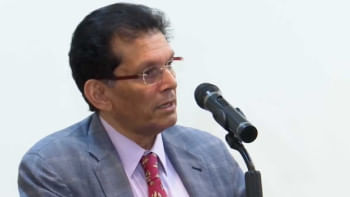Nabbing militants in Chittagong
The Rapid Action Battalion busted a hilltop training camp of the Harkat-ul-Jihad-al-Islami in Chittagong on Monday. Obviously it is good news, for it demonstrates the state of alert in which the security forces remain where handling militancy is concerned. There is little question that despite all the operations against them, large numbers of religious militants remain active and could yet pose a grave threat to the security of the state. A heightened and constant state of alert is, therefore, a clear necessity. Unless these disruptive elements are tackled firmly and militancy is firmly put to an end, the future of democratic politics in Bangladesh will remain something of a question mark.
That said, it must be noted that despite all the organized state action against militants, forces like Huji keep rearing their heads and are found ensconced in different pockets of the country. That should serve as a telling message for all, the government as well as the people of the country. It is quite clear that even as we have gone in determined fashion after the extremists, we are yet to have a situation where we can legitimately claim that militancy has been done away with for good. The question now arises as to whether or not a change in strategy in dealing with extremism is called for. The constant raids we have seen being made against militant camps are certainly a necessity. The militants need to be nabbed and their hideouts destroyed. But then comes the question of what the government must do about convincing the militants, once they are captured or arrested, that theirs is a wrong course and that they need to come back to society as individuals willing to respect others and adhere to the law. In other words, the task of nabbing militants must be followed by a process of re-education for them. Nothing can be more dangerous than for the state to keep militants in prison and punish them for their activities without considering measures of how they can be reformed and returned to society.
A process of re-education for militants is rendered all the more crucial by the fact that their extremism is based on a severe degree of indoctrination they have gone through at the hands of their militant mentors. What has so far been happening is that once a group of militants is nabbed or killed, a fresh new group emerges, necessitating new action on the part of the security forces. In other parts of the world, re-education of people considered dangerous for the state has been the norm over the past many years. The system can be replicated here.
One cannot ignore the fact that most of these religious extremists happen to be young men driven by what they think is a cause. It then remains the responsibility of the state and society to wean them away from their incendiary ideology and restore in them the belief that politics is a matter of accommodation, that it is an arena where diverse and divergent points of view are at peaceful play. More importantly, measures must be taken at the intellectual, academic and political levels to ensure that the young do not fall for or embrace such lethal ideologies. Preventive steps, more than corrective ones, are the requirement.
The discovery of the Huji camp in Chittagong is a call for intensified action against militancy. It is, at the same time, an opportunity for a rethink on how we should be dealing with militants, the better to enable them to understand the folly of their ways.

 For all latest news, follow The Daily Star's Google News channel.
For all latest news, follow The Daily Star's Google News channel. 



Comments